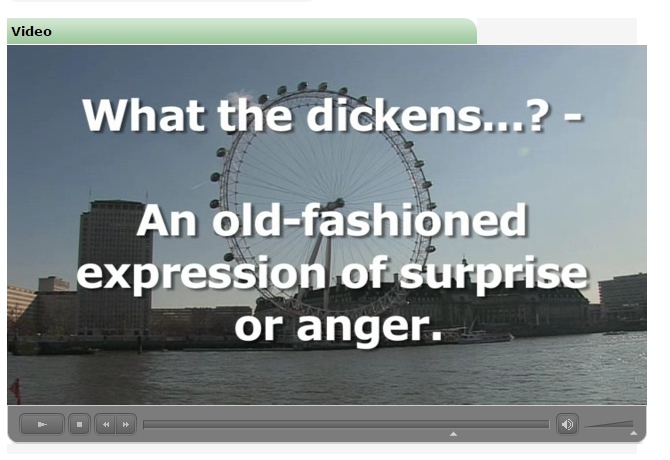Dickens пишите с маленькой буквы. А то вводите в заблуждение тут некоторых...
dickens ['dikinz] informal, dated used for emphasis, euphemistically invoking the Devil
they work like the dickens | she was in a dickens of a rush
■ the dickens - used when asking questions to express annoyance or surprise
What the dickens is going on?
P.S. Answering you questions, mostly.
Лингвистика
What the Dickens do all you do here?
What the Scott are you?
Using correct word order would make you appear even more gallant than you think you are.
Павел Луняшин
Where is mistake?
Dickens did everything he could 'cept eat us
Most of us have read at least a few Dickens novels, and many more will be familiar with his work through TV and film adaptations. Dickens was the great chronicler of the huge social and economic upheavals which transformed London in the mid decades of the 19th century. It was a time of urbanisation and industrialisation which created terrible problems of overcrowding, sickness and poverty, alongside the great energy and opportunities for wealth and social advancement of the new age. Dickens was able to convey the intensity of this world through the creation of some of the best known characters in the literature of the English speaking world, like Oliver Twist, David Copperfield and Scrooge.
It is a world which is not altogether unfamiliar to a traveller in some of the cities of this region which are currently going through similar transformations in this, the Asian century. Indeed “Dickensian” is an adjective that sometimes springs to mind to describe our impressions of places teeming with vitality and opportunity alongside economic inequality.
Dickens was fascinated by Australia. He never managed to visit, as he did with America where he made two lucrative lecture tours (whilst railing against breaches of his copyright by the fledgling US publishing industry). But two of his sons emigrated here and the younger, Edward known as “Plorn”, was briefly a member of the NSW Parliament.
Dickens saw Australia as a place where hard work would be rewarded. It was an ex-convict, Magwitch, whose fortune enabled Pip to secure advancement in Great Expectations. And at the end of Oliver Twist, the Artful Dodger was transported off to Australia, no doubt to future
Most of us have read at least a few Dickens novels, and many more will be familiar with his work through TV and film adaptations. Dickens was the great chronicler of the huge social and economic upheavals which transformed London in the mid decades of the 19th century. It was a time of urbanisation and industrialisation which created terrible problems of overcrowding, sickness and poverty, alongside the great energy and opportunities for wealth and social advancement of the new age. Dickens was able to convey the intensity of this world through the creation of some of the best known characters in the literature of the English speaking world, like Oliver Twist, David Copperfield and Scrooge.
It is a world which is not altogether unfamiliar to a traveller in some of the cities of this region which are currently going through similar transformations in this, the Asian century. Indeed “Dickensian” is an adjective that sometimes springs to mind to describe our impressions of places teeming with vitality and opportunity alongside economic inequality.
Dickens was fascinated by Australia. He never managed to visit, as he did with America where he made two lucrative lecture tours (whilst railing against breaches of his copyright by the fledgling US publishing industry). But two of his sons emigrated here and the younger, Edward known as “Plorn”, was briefly a member of the NSW Parliament.
Dickens saw Australia as a place where hard work would be rewarded. It was an ex-convict, Magwitch, whose fortune enabled Pip to secure advancement in Great Expectations. And at the end of Oliver Twist, the Artful Dodger was transported off to Australia, no doubt to future
Павел Луняшин
Where is all it from?
Какого дьявола вы все тут делаете?! (Это перевод.) :)
bbc.co.uk/worldservice/learningenglish/language/theteacher/2012/02/120207_teacher_dickens.shtml
Ссылку вставьте в поисковую строку. Полная ссылка не принимается "Ответами".

bbc.co.uk/worldservice/learningenglish/language/theteacher/2012/02/120207_teacher_dickens.shtml
Ссылку вставьте в поисковую строку. Полная ссылка не принимается "Ответами".

Павел Луняшин
Да я в курсе) Это и был вопрос.
Похожие вопросы
- Do you have any problems in english ? What should you do? What is the best way to learn english? Как ответить на это??
- What are you doing tomorrow? или What will you do tomorrow?
- Please can you review my essay about the tree. Thanks all
- Какая разница между вопросами What are you, Who are you, What do you do, когда надо узнать о работе? British English
- Вопросительное предложение "How do you do"
- Where do you think you're going? 'It's nothing to do with you. Как адекватно перевести эти два предложения ?
- How long have you been here FOR?Please DO visit me sometime! Какую вообще функцию исполняет выделенное?
- "What do you do see ?" Может ли существовать такой вопрос ? И если да, то что он значит ?
- How do you do? How's it going? What's up? - в чем разница?
- Вопрос неправильный "Do you can?" но "Can you do?" правильный, почему?



